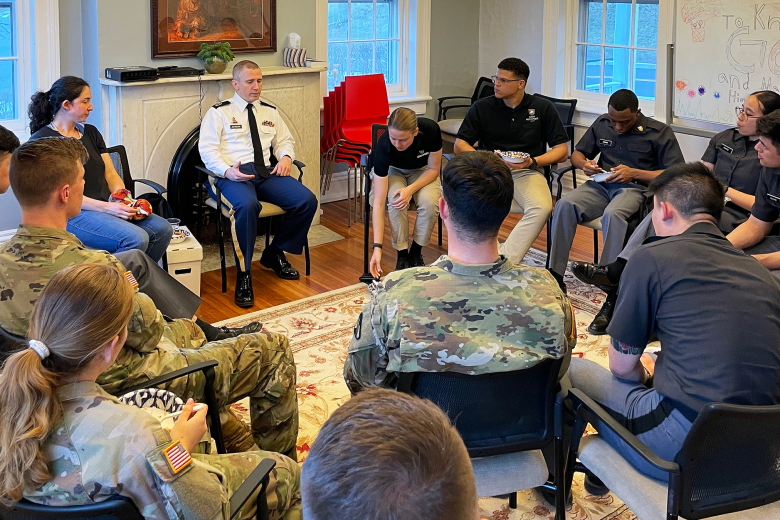In the collective American psyche, heroes loom large. Chief among them are two familiar figures who represent the ideals for which the nation strives: Superman and the American Soldier.
At the unexpected confluence of their stories is Master Sgt. Philip Kennedy Johnson, who visited West Point’s Department of Social Sciences (SOSH) March 20-22 in collaboration with the West Point Music Research Center to share his storytelling expertise and the path that led him to double-barreled hero-dom.
Johnson has spent nearly 20 years as a trumpet player and active-duty Soldier with the U.S. Army Field Band at Fort Meade, Maryland.
During his journey to becoming a professional musician, he spent many years honing the craft of storytelling through the bell of his trumpet, but it was only as an adult that he began to explore additional avenues of narrative.
“I have a younger brother who is an illustrator and who really wanted to get into comics,” Johnson said. “I’d loved comics growing up but hadn’t read them in a long time, so it was a fun excuse to try a new creative outlet, and I started writing things for him to illustrate.”
From there, Johnson began collaborating with other artists in published comic books that gained the notice of industry giants DC and Marvel.
“This path just started taking its own shape and I started getting opportunities I didn’t want to say no to,” Johnson said.
Johnson’s writing credits now extend to the upper echelons of the superhero canon, including contributions to the Superman, Captain America and Aquaman series, among many others. He has also published his own original works “Last Sons of America,” “Warlords of Appalachia” and “The Last God.”
During his visit to West Point, Johnson shared his wealth of experience on the topic of storytelling as a guest lecturer in “Music and Influence” a SOSH class where cadets study how to use and quantify music as a tool of influence.
Drawing on his dual expertise in music and narrative, Johnson also provided guidance on the cadets’ multimedia semester projects, which will be evaluated by the U.S. Army John F. Kennedy Special Warfare Center and Psychological Operations School.
“Music can back up your narrative extremely effectively,” Johnson advised – with a caveat. “Narratively, music is completely unspecific. But emotionally, it’s completely specific.”
When asked what influenced his personal take on the beloved character of Superman, Johnson relayed a memory from his childhood and reflected on how his fellow Soldiers inspire his writing.
“I was this kid reading the story of another kid who was sent into farmland – where I was – and who discovered people who loved him, that he had great purpose, that he was sent there to help everyone be better and do better,” Johnson said. “It was a powerful fantasy that meant everything to me. So, to me, Superman should represent the best of us. And to me, (Soldiers) do that, too. I want to represent the Army and the concept of service to my readers and let them see what we’re capable of.”
Johnson concluded his lecture by encouraging cadets to consider how they can use the narrative, visual, and musical arts as effective tools for conveying the messages that are most important to them as they prepare for careers as leaders in the U.S. Army.
“My job at the Army Field Band is to connect America with its Army and teach people the importance of service... and I’ve found that my work on Superman is not super different,” Johnson concluded. “I’m still telling people about the importance of service.”
